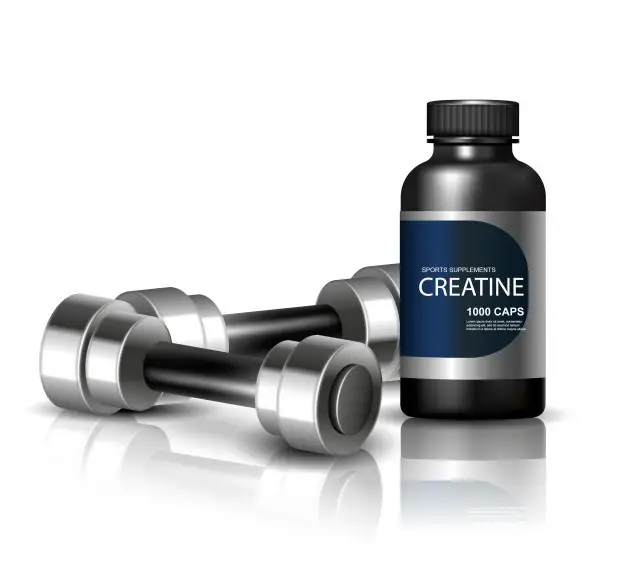Creatine is a popular supplement used by athletes and bodybuilders to enhance their performance and build muscle mass. However, many people wonder if it is safe to consume creatine without working out. The answer is not straightforward, as there are several factors to consider.
Firstly, it is important to understand what creatine is and how it works. Creatine is a natural compound found in the body, primarily in muscles, and it helps to produce energy during high-intensity exercise.
When taken as a supplement, creatine can increase the amount of creatine in the muscles, which may improve performance during exercise. However, without exercise, the body may not use the extra creatine effectively, and it may lead to unwanted side effects.
Understanding Creatine
Creatine is an amino acid that occurs naturally in the body from methionine, arginine, and glycine. It plays a vital function in the generation of adenosine triphosphate (ATP), which serves as the primary energy source for muscles.
The body stores creatine in the form of phosphocreatine, which can quickly convert into ATP to provide energy during high-intensity activities like weightlifting or sprinting. Creatine reserves can be boosted by consuming supplements.
Many athletes and bodybuilders consume creatine supplements to increase their performance during workouts. However, some people wonder if it’s possible to consume creatine without working out.
While creatine supplements can be consumed without working out, it’s important to note that they are designed to enhance physical performance during high-intensity activities. Taking creatine without engaging in physical activity may not provide any noticeable benefits.
Moreover, immoderate consumption of creatine supplements can result in unfavorable outcomes such as stomach cramps, diarrhea, and dehydration. Hence, it’s crucial to adhere to the recommended dosage and seek advice from a healthcare professional before initiating any supplement routine.
Creatine and Muscle Development
Creatine is a popular supplement among athletes and bodybuilders. It is known to improve muscle strength and power, which makes it a common choice for those who want to enhance their performance. However, many people wonder whether it is possible to consume creatine without working out and still see muscle development.
The short answer is that creatine can help with muscle development, but it is not a magic pill. The mechanism of action of creatine involves augmenting the quantity of phosphocreatine in muscle cells, thereby facilitating the generation of more energy during high-intensity workouts. This increased energy production can lead to better muscle performance and growth.
While creatine can help with muscle development, it is important to note that it is not a substitute for exercise. Without proper strength training or resistance training, the benefits of creatine may be limited. Additionally, consuming creatine without exercising may lead to weight gain or other health issues.
It is also important to note that the effects of creatine on muscle development may vary depending on the individual. Some people may see significant gains in muscle mass and strength, while others may not see much of a difference. Factors such as diet, exercise routine, and genetics can all play a role in how effective creatine is for muscle development.
Creatine and Energy Production
Creatine is an organic compound that is naturally present in the human body. It performs a vital function in energy production and serves as a crucial element in the adenosine triphosphate (ATP) regeneration process. ATP, also known as adenosine triphosphate, acts as the primary energy source for the cells in the body.
When the body requires energy, it decomposes ATP into ADP (adenosine diphosphate) and discharges energy. Creatine assists in restoring ATP from ADP, enabling the body to sustain high levels of energy during intense physical activity.
Research has demonstrated that incorporating creatine supplementation can augment energy availability and enhance endurance and stamina. This can be particularly advantageous for athletes and individuals who participate in high-intensity workouts.
Creatine has also been found to increase fatigue resistance, which can help individuals to perform at a higher level for longer periods of time. This is due to the fact that creatine helps to reduce the accumulation of lactic acid in the muscles, which is a major contributor to fatigue.
Creatine and Cognitive Function
Creatine is a popular supplement among athletes and bodybuilders, but it has also been suggested to have benefits for cognitive function. Creatine is naturally found in the body and is involved in energy metabolism, particularly in the muscles and brain.
Research has shown that creatine supplementation may improve cognitive function, particularly in tasks that require short-term memory, attention, and reasoning ability. In a study of healthy young adults, creatine supplementation was found to improve performance on a test of working memory and intelligence.
Creatine may also have benefits for individuals with neurological diseases or cognitive decline. Studies have shown that creatine supplementation may improve cognitive function in individuals with Parkinson’s disease and Huntington’s disease.
In addition, creatine may have benefits for the elderly population. Research has shown that creatine supplementation may improve cognitive function and reduce the risk of falls in older adults.
Creatine and Exercise
Creatine is a popular supplement among athletes and fitness enthusiasts. One of the primary reasons people take creatine is to improve their athletic performance during exercise. Creatine has been shown to increase strength, power, and muscle mass, which can be beneficial for those looking to improve their physical performance.
Regarding creatine and exercise, it’s crucial to note that creatine is most efficacious when employed in conjunction with consistent exercise. While creatine can provide some benefits on its own, it is not a replacement for exercise.
In terms of specific types of exercise, creatine has been shown to be particularly effective for activities that involve short bursts of intense activity, such as sprinting or weightlifting. However, creatine can also be beneficial for endurance activities, such as long-distance running or cycling.
It’s crucial to acknowledge that creatine supplementation should be employed in tandem with a comprehensive workout regimen that encompasses rest days and a diverse range of exercise forms. Furthermore, creatine should not be employed as a replacement for adequate nutrition or hydration.
Creatine and Diet
Creatine is a naturally occurring compound found in red meat and fish. It is also produced by the human body. Creatine is often taken as a supplement to improve athletic performance, but can it be consumed without working out?
The answer is yes, creatine can be consumed without working out, but it may not provide the same benefits as when taken in conjunction with exercise. Although creatine supplementation can assist in augmenting muscle mass, strength, and endurance, it is most efficacious when utilized in conjunction with resistance training.
In terms of diet, creatine can be obtained through the consumption of red meat and fish. However, it can be difficult to consume enough creatine through diet alone to see the benefits associated with supplementation. This is where creatine supplements come in.
When taking creatine supplements, it is important to also consider one’s diet. Carbohydrates, particularly simple carbs, can help increase the uptake of creatine into the muscles. Protein is also important for muscle growth and repair, which can further enhance the benefits of creatine supplementation.
For those looking to maximize the benefits of creatine, a loading phase may be considered. This involves taking a higher dose of creatine for a short period of time to saturate the muscles with creatine. This can be followed by a maintenance phase where a lower dose is taken to maintain creatine levels in the muscles.
Creatine Supplementation Without Exercise
Creatine is a prevalent dietary supplement that athletes and bodybuilders frequently employ to optimize their training performance and augment muscle growth. Nonetheless, several individuals ponder whether they can consume creatine without exercising and still reap its advantages.
While creatine is typically associated with exercise and physical activity, there is some evidence to suggest that it may still have some benefits for individuals who are not actively training. For example, some studies have shown that creatine supplementation may improve cognitive function and memory in older adults, as well as reduce fatigue and improve mood in individuals with depression.
Moreover, creatine might offer some potential health benefits, such as ameliorating inflammation and enhancing heart health. Nevertheless, further research is necessary to comprehensively comprehend the effects of creatine supplementation on non-exercisers.
It’s crucial to note that creatine supplementation is generally deemed safe for most individuals, but it can cause side effects like stomach cramps, nausea, and diarrhea. Additionally, it’s essential to adhere to the recommended dosage instructions, as excessive consumption of creatine can be detrimental to the kidneys and liver.
Potential Health Implications
Consuming creatine without working out may have potential health implications. While creatine is generally considered safe, it can cause some side effects in certain individuals.
One potential issue is that creatine supplementation can cause bloating and dehydration. This can lead to thirst and the need for increased hydration. Additionally, creatine can upset the digestive system and cause stomach discomfort.
There is also concern that long-term use of creatine may impact liver and kidney function. However, research has shown that there is no evidence of harm to healthy kidneys or liver function with moderate creatine supplementation.
Creatine may also have some positive effects on bone density and blood sugar regulation, as well as antioxidant properties. Nevertheless, additional research is required to comprehensively comprehend these prospective advantages.
Creatine for Special Populations
While creatine is often associated with athletic performance, it may also have benefits for certain special populations. Here are some examples:
Vegetarians
Vegetarians may have lower levels of creatine in their muscles due to their diet. Supplementing with creatine may help increase their muscle stores and improve their exercise performance. In fact, research has shown that vegetarians may experience greater benefits from creatine supplementation compared to non-vegetarians.
Elderly Population
As people age, their muscle mass and strength tend to decline, which can increase the risk of falls and other health issues. Creatine supplementation may help preserve muscle mass and improve strength in older adults. Studies have shown that creatine supplementation can increase muscle strength and power in older adults, as well as improve their ability to perform activities of daily living.
It’s essential to acknowledge that although creatine supplementation may offer potential advantages for specific groups, it’s always advisable to seek guidance from a healthcare professional before commencing any new supplement regimen.







